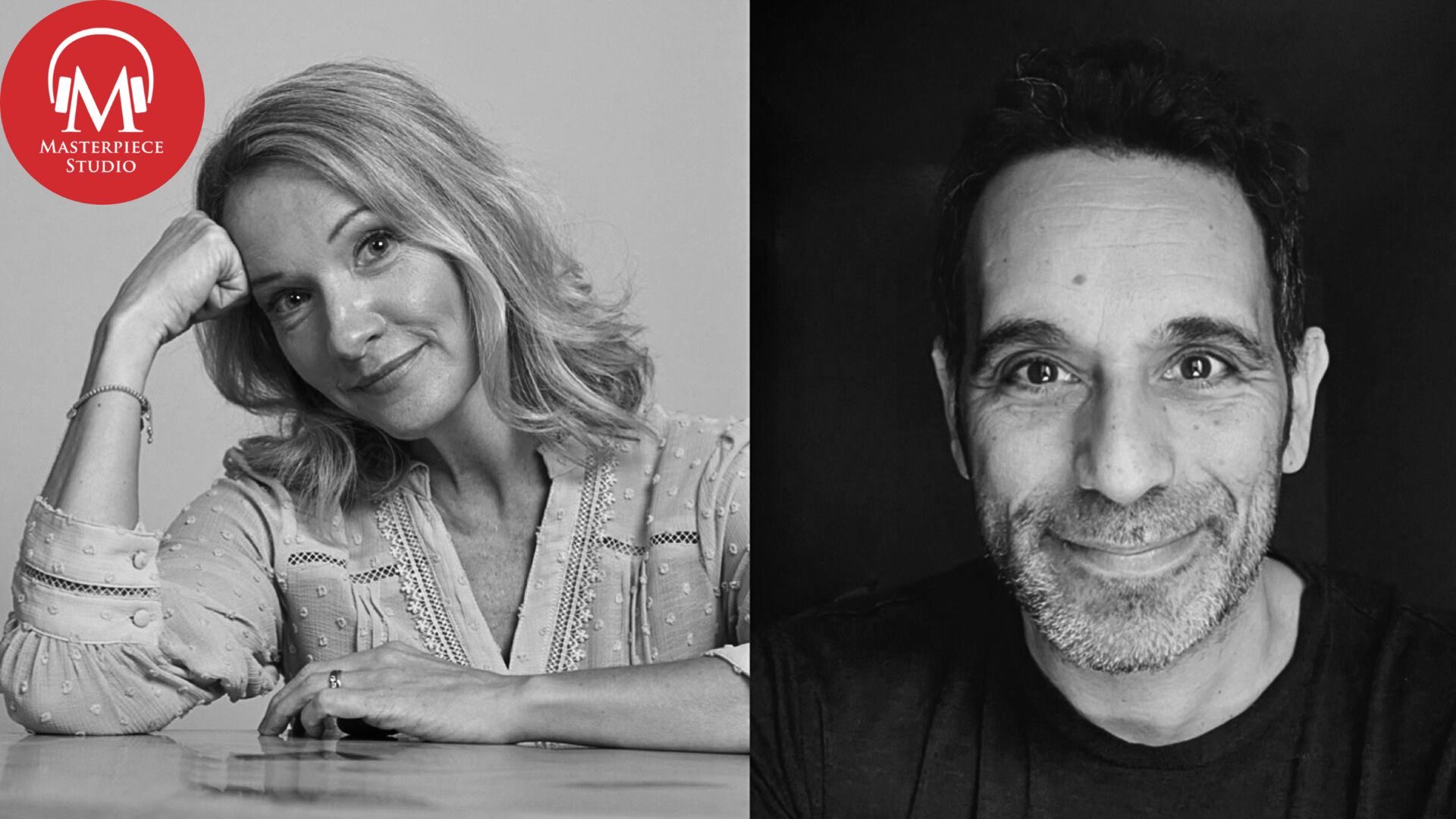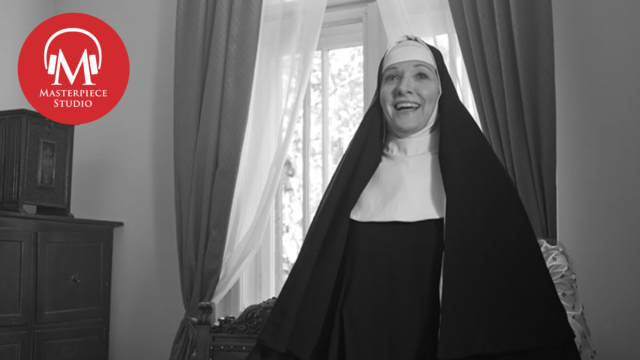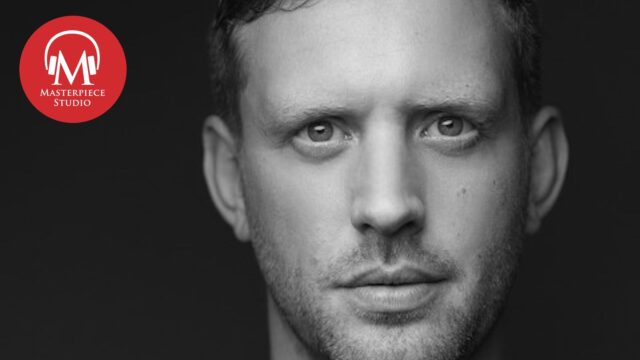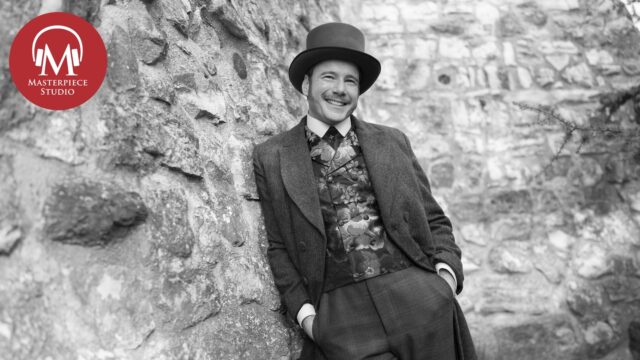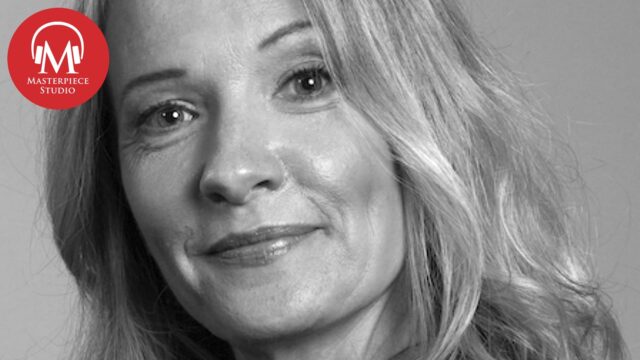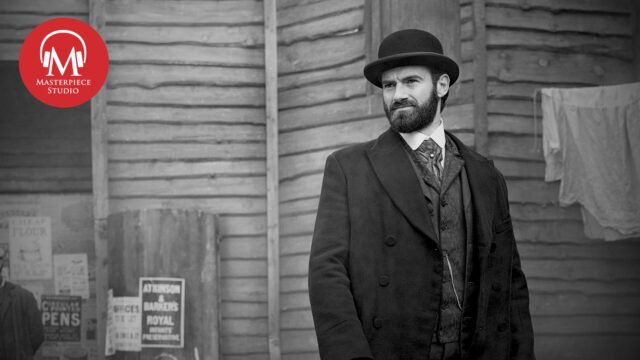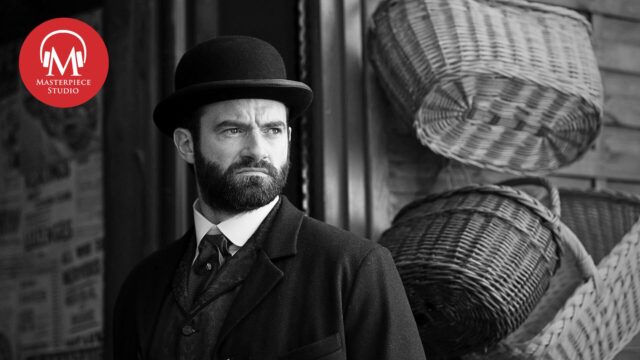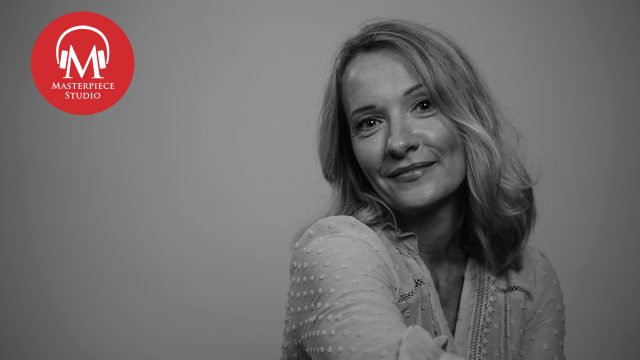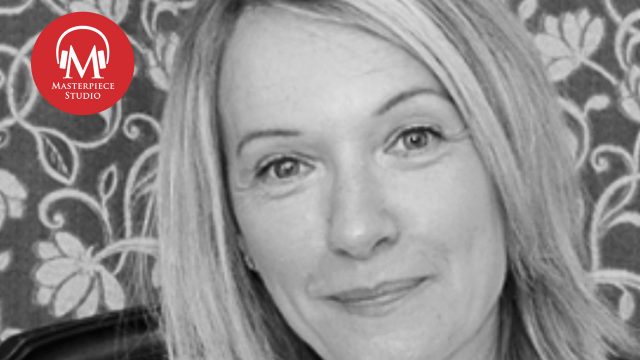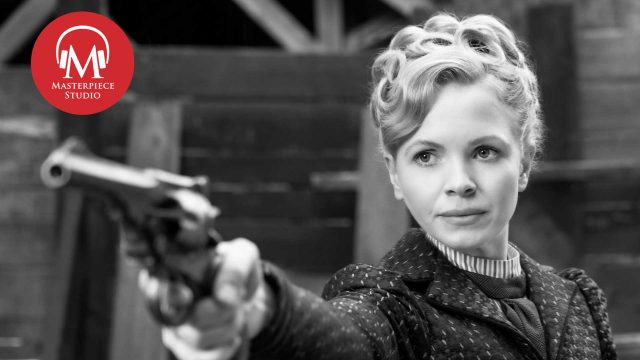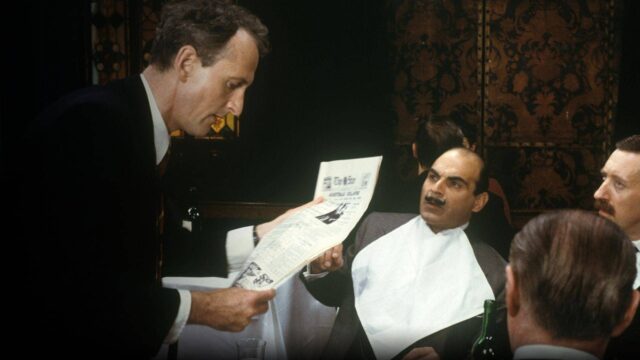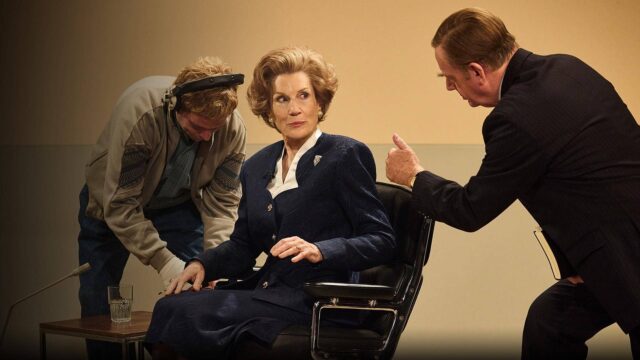This script has been lightly edited for clarity.
Jace Lacob: I’m Jace Lacob, and you’re listening to MASTERPIECE Studio.
It’s Season Four of the arresting Victorian crime drama Miss Scarlet and The Duke, and already by episode three, we’ve seen corrupt politicians, a mystery gunman in a gentlemen’s club, and a murder in a funeral home. But no matter how twisted or complicated the case — or difficult the client — Eliza Scarlet always seems to deliver.
CLIP
Eliza: It was, as you say, a satisfying conclusion. So, I wonder if you have any comments on my handling of the case, Mr. Potts?
Mr. Potts: You did a very, um, capable job, Miss Scarlet.
Eliza: Thank you. I’m just happy to be able to demonstrate my professionalism.
But over at Scotland Yard, the Duke isn’t as fortunate. At the end of Episode Two, a police ambush turned gunfight left Wellington in a dire state.
CLIP
Fitzroy: Miss Scarlet. Eliza.
Eliza: What is it? What’s happened?
Fitzroy: It’s inspector Wellington.
Eliza: What about him?
Fitzroy: He’s been shot. They’re performing surgery, but they’re not optimistic. They cannot say for certain if he will survive.
Episode Three opens with William in a coma and Eliza by his bedside. As she urges him to wake up, her words echo increasingly distant as we’re cast into a coma-induced flashback. Inside the world of young William and Eliza, we catch a glimpse of their formative years — including their first meeting and, most crucially, that oft-mentioned kiss. And this view into the past reveals that their unique dynamic has been there from the start.
CLIP
William: I thought you said there’d be real food.
Eliza: There should be canapés somewhere.
William: What are canapés?
Eliza: They are small snacks. And it’s pronounced can-a-pay.
William: Can of peas.
Eliza: No, it…are you teasing me?
William: Yes.
Writers — and spouses — Rachael New and Ben Edwards join us this week to bring us inside their writing process and discuss how they arrived at the first ever flashback episode of Miss Scarlet and The Duke.
Jace Lacob: This week we are joined by Miss Scarlet and the Duke writers and producers Rachael New and Ben Edwards. Multihyphenates both of you.
Rachael New: I know, we sound very clever, don’t we?
Ben Edwards: Multihyphenate, that’s very nice, I like that. Can I put that on my bio?
Jace Lacob: I mean, director, producer, writer, you have done it all on this show. Before we delve into the specifics of this episode, I want to talk a little bit about your dynamic. You’re writing Miss Scarlet, which is a romantic mystery drama. It’s brimming with intrigue and banter and tension. As a married couple, does having the shorthand of couplehood speed the process along when you’re breaking stories?
Rachael New: So, I’m not sure it’s even about being married. I think when you’ve worked together as long as Ben and I have worked together, we are a very long-standing writing partnership, so it’s just about having that shorthand really. I don’t think you have to live with somebody to get that, it’s about how long you’ve worked together. So that really helps us with firing off ideas, bouncing ideas off each other. So yeah, it’s a huge help that we do have that shorthand.
Ben Edwards: I think also the one benefit we do have, the proximity thing is useful, particularly the nearer to production you get. It can be half 11 on a Sunday night and we go, oh, we’ve had an idea. And we can just sit down and work together. But I guess these days with Zoom and stuff, that doesn’t matter so much. But I think that, like Rach says, by this point, we’re so used to the separation between the personal and the professional that it’s not really a problem at all. Although at least on the really practical side as well, if you’re writing with your partner, all the money comes into the house, you don’t have to split it up. That’s one thing.
Jace Lacob: You know, even if you do have a policy about keeping the professional and the private separate, I would imagine, as you’re saying, if at 11 o’clock on a Sunday night, if you have an idea that’s bleeding into time that might be designated personal time, how do you work to separate those two spheres within your life?
Rachael New: I think we used to struggle with it, actually. I spent a lot of time hiding from Ben if I didn’t want to work. He’d always find me. Nowadays, I think we are able to separate it much more. First thing in the morning, we seem to be able to do a lot of the story lining and the structuring and scripting. But after about four o’clock in the afternoon, you’re kind of brain dead anyway. And I think generally now we know that any idea that does come at half 11 at night is probably not going to be very good. So, we do tend to, I would say, keep it more to ourselves, and then the next morning we’ll go, okay, right, I had a thought last night, blah, blah, blah. So, there is more of a professional separation now.
Ben Edwards: There is another thing as well that I think is really beneficial, because a lot of my friends, I guess your friends too, they go, oh, how can you work with your partner? Doesn’t it drive you insane? And I think that the plus side is let’s imagine I was a dentist and Rachael was an accountant or something, and you’re having a really bad day and you come back and you go, I had a very bad day today being a dentist. There’s only so much you can really share with that person that doesn’t do the same job.
But if you literally both do the same job working on the same show, then the problems are understood, the people you work with are understood, and you can actually help each other in a way that you couldn’t if you did separate jobs.
Jace Lacob: I am intrigued by how writers who have written together for a long time who are also married, how they manage not just workflow, but also the necessary division of labor that goes into it. Together you scripted all of series one and two. Who typically handles what? And how does Patty Ishimoto figure into the day-to-day division of labor? Or does she function sometimes as a needed referee?
Rachael New: She would absolutely love that. The way we work is we storyline together and we beat out the episodes together. So, we have very general chats at the beginning to work out Eliza’s journey and the main characters. And then what we do when we feel that we’ve got the structure nice and tight for each of the episodes, we’ll go off and write the episodes ourselves. And then we essentially script edit each other’s scripts. So, it’s very collaborative, but also, we do have quite a bit of ownership of our own episodes.
Patty is one of the team of, I’m thinking four execs who will read the scripts, and then they come back and give notes, and then we’ll address those notes. So, that’s more or less how it works. And then as we get nearer into production, I’ll often have to do another pass in terms of addressing location issues and production issues. So, the main thrust of the work we do together.
Ben Edwards: And one other thing as well that I think is beneficial in this show is this show was created by Rachael. So, sometimes you’ll get writing partnerships where they both created the show. And so therefore we will work closely together, and we may agree on some things and disagree on other things, but ultimately on this, Rachael will have a veto over me.
Rachael New: Which I really enjoy.
Ben Edwards: When there’s two of you, if we disagree on something, or push back enough, but ultimately, you know, in that sense, it is her show. So therefore, if there are disagreements, we’ve never had any real fundamentals, but there are times when you’re breaking any story where you’re not sure, if there’s two different ways to go. And we will talk it through. And ideally, in fact, pretty much every time we’re both happy with it. But that is one difference here, whereas had we both created the show together, then those would be harder discussions to have, I think.
Jace Lacob: I love the thought that Rachael has her finger on the scale there. She’s able to weigh it down as the creator. I have three words for the two of you, and that is Bumps and Bruises. Your 2004 BBC Radio 4 play with Penelope Wilton, Tamsin Greig, Emily Blunt. It seems to be the first produced work that you co-wrote, preceding ITV’s workplace dramedy Monday Monday by a few years. How would you describe the experience of writing this radio play together?
Ben Edwards: That’s great research, Jace. That’s very good. And that was really good fun. So, Bumps and Bruises is a Radio 4 play about I guess what you’d call a Lamaze class, an antenatal class, that’s what we were going through at the time. We were having our first child, Grace, Rachael was pregnant, and we went to a series of antenatal classes. And this would be once a week for say five or six weeks towards what were you like, seven months pregnant at the time? And the people there, there were us and maybe five or six other couples, and they were just comedy gold. They were brilliant.
Rachael New: Particularly the teacher.
Ben Edwards: They were lovely people. There was an instructor who, it was her first time, and she was really nervous. And there were the other people and they just kept saying these things and we were like, this is brilliant! You know, when people come out with almost perfectly formed dialogue and we were writing it down bit by bit, and we were like, we should just write this. This is really funny. And so, it just came out of a real-life experience and just had a perfect structure because they’re like four or five classes and then a baby. And so, it’s almost like this little gift of a real-life experience that also works for drama.
Rachael New: Can I just make it clear that we don’t usually sit with friends and write down their dialogue. We’re not like spies. It was just this particular one where I think it was just such a strange situation to be in, we’d never been in that situation before, and everything is so heightened because everyone wants to be perfect parents and everyone’s very nervous and it just seemed to bring out the slightly crazy in people.
Ben Edwards: There was a guy, he was very well meaning and lovely, but he was saying, when my wife is in labor, what kind of food should I bring in? And the woman running the class said, well, she probably won’t want to eat when she’s in labor. And he said, no, no, for me. Should I bring in high carb food so I can keep my energy up? It was just stuff like that. And we’re like, that’s funny.
Jace Lacob: That’s amazing. I had already admitted to Rachael a while back that I was a huge fan of Monday Monday when it aired. You talked about having the support of one another as co-creators as a couple. Did it help to have a co-creator on Monday Monday when things were perhaps going not so well for the show after release, who you knew would have your back?
Ben Edwards: Oh yeah, definitely. That was really hard going, and I think the honest truth of that was that probably came too early for us as a writing partnership in that we’d written that play that you just mentioned, we’d written a couple of episodes of other shows. It’s one thing to write episode three of season four of an established show that you’ve seen for someone else, because you’ve seen the show, you know the actors look like, what they sound like. There’s a support network of people who know what the show should be, and they will guide you through.
Then we wrote a spec script really, based on a workplace comedy drama. And when you’re starting something from scratch and you’ve never seen the actors, you don’t know who you’re going to cast, it’s a completely different thing. And then of course you spend a long time writing the pilot episode. And then we actually went in, we had an incredible meeting at ITV, we went in on a Tuesday and they greenlit it two days later. It just went straight to series, seven parts, away you go. And we were like, oh, TV is easy, isn’t it? We didn’t really, if we’re honest, know how to create an entire show, how to build story arcs across the season. And as a result, yeah, it was scary. It’s one of those bad experiences where you go, I learned a lot, I’m sort of glad it happened, but I’m very glad it’s over.
Rachael New: I watched it again recently and I really enjoyed it. I’m so glad you enjoyed it, Jace. It was very, very different to, say, Scarlet because it wasn’t the showrunner system, we were hired guns, we were writers, we came up with the idea and we did the pilot, but we had very, very little control over the actual series.
Jace Lacob: I want to jump ahead to Miss Scarlet and the Duke. You two are so lovely together, and the banter between Eliza and William is one of the things that I love most about Miss Scarlet. And there’s just such a delicious wit to their exchanges as well as an emotional core. Does any of that banter come from your own dynamic? Are you pulling from things you say to each other?
Ben Edwards: Oh, definitely. I think that’s what has to keep your spirits up when you’re plowing through an episode and it’s taking longer than you think it would. It’s that release valve, isn’t it? Because also, we know each other so well. It is like Eliza and Duke.
Rachael New: I’d say Ben’s a little more Nash in his wits. He’s very witty. But yes, the dynamic is quite similar, which is me usually getting a bit frosty about something and him trying to convince me by just firing off a hundred reasons why something should work. So, there is something very similar in the way we communicate.
Ben Edwards: I think that sometimes there are times where, we haven’t done it in this season, but Duke has a very good, “no.” And there are times over the years where I feel like, and this is something I think I’ve learned not to do, but we will be discussing an idea and I will just go, no. And that’s terrible. And you know, the familiarity breeds contempt thing is, if you are writing with someone who you’re not married to, you’ll perhaps phrase things more politely. And so sometimes that can be a danger of just being too rude to each other.
Rachael New: There’s lots of “absolutely not.”
Ben Edwards: Oh, and the other thing as well, I think one thing we’ve learned as writers much more now is how to get through an episode that isn’t working as well. And in fact, there are times where you’ll get to it and you may have the whole thing beaten out and you look at it and you’ve been spending a good few weeks on it and you go, it’s not working, you’ve got to bin it. And that’s something that comes with experience that, you know once a season, there’ll be an episode that’s really difficult and it isn’t working, and you have to kill it and start again, and it will always be better.
And I think that happens on almost every show that there’ll be one episode that it seems like a good idea, and you get quite far down the line and it’s knowing at what point to pull the ripcord and just go, no, it’s not happening.
Jace Lacob: I mean, Ben, we’ll get to that episode of Eliza on the moon.
Ben Edwards: That’s the one!
Jace Lacob: Didn’t work in series four, unfortunately. This show often zigs when you expect it to zag. Kate Phillips and Stuart Martin only appear in the framework narrative of episode three, with the majority of this episode actually taking place in flashback, as we see the younger versions of Duke and Eliza meet. How did the idea for this flashback episode come about?
Ben Edwards: Well, it’s definitely the most fun episode that we’ve written, I think, or most enjoyable to write. We talked about doing it for a while, for a couple of seasons, really, because if you remember in the pilot episode, in episode one of season one, there’s an exchange, there’s a walk and talk, and they talk about their first kiss. And they talk about the argument they had, and it was always something we thought like at some point that might be a nice idea to do a flashback episode. But I think we both felt that the show has to bed in a bit before you do that.
It was something we always wanted to do to just look at an origin story, really, how they met, Duke was mentored by Henry Scarlet. So, they’ve obviously been in each other’s lives for a long time, and I think we just thought season four, this is the time to get into it.
Rachael New: Yeah, there’s a lot of history embedded in this show between these two characters, and we just thought how lovely it would be to take the fans on a little journey back in time to go this is where it all began for them. This is where they first met. And, yeah, it was really fabulous. I’m so proud of the episode.
MIDROLL
Jace Lacob: You mentioned the kiss, and I figured that we would actually see that in this episode, and I’m glad that we did. But what’s interesting to me is that when the Duke recounted this kiss, he said Eliza was crying because her dog had died. Here we see that her grief is far deeper than that. It’s jealousy over William joining the police force, something denied to her as a woman.
CLIP
William: I’m thinking about joining the police. Your father said he’d put in a word for me.
Eliza: You’re joining the police?
William: I still don’t know if I actually will, but they say the money’s quite good. God knows what I’d look like in the uniform.
Eliza: This damn…
William: Here, let me.
Eliza: No, I’m more than capable of doing it myself, thank you.
William: Have I upset you?
Eliza: No, it’s just this dog. This stupid, damn dog! It’s not fair William, it’s not fair.
William: Please, just stop crying.
Jace Lacob: And then she kisses him. How much is this act about Eliza exerting an agency here that’s denied to her elsewhere?
Rachael New: Oh, absolutely. It’s all about that. We had a lot of fun talking about the kiss. We were both in agreement straight away that it should be her. Because it’s much more fun, with Eliza as well, I don’t know how well you remember the conversation in season one about the kiss, but she was adamant that he kissed her and it was like, no, she kissed him. So yes, there is an awful lot of female empowerment there. But very early on, we decided it should be her to be the one that makes the move on him.
Ben Edwards: And also, again, if you watch the exchange between them in the pilot episode in season one, they talk about the fact that yes, he was consoling her over her dead dog. But then she says, and then they talk about the fact that she slapped him. And when we came to write it, we were like, I think that would ruin a really lovely moment if they kiss and then she slaps him. So, what we feel is that somehow, they misremembered it and that perhaps there’ll be another occasion in the future when they were younger where there was an attempt at a kiss and maybe she did slap him then. But that was one of those things we looked at and we just thought that would ruin a really beautiful moment if she suddenly slapped him.
Jace Lacob: He also recalls this as a “chaste kiss” when what we see here is anything but that. But my bigger question about that, that you’re touching on Ben, is what does this particular moment say about memory, about perspective or even about gender?
Ben Edwards: Well, certainly in terms of memory, of course, your memory changes, doesn’t it? It doesn’t stay the same. You project onto it what you want to project. And with the slap thing, again, we could argue that she thinks, well, I didn’t want that to happen, she’s rewritten in her head. But in terms of gender, yeah, absolutely. It’s good that she’s an unconventional person that doesn’t behave with the mores of the time. And therefore, her kissing him is very on brand with Eliza, rather than just waiting to be kissed.
Jace Lacob: Ivy comes in and interrupts their embrace because Eliza’s going to be late to get back to college. Her entrance breaks this spell between them. What do you think would have happened, what would have been said perhaps, had Ivy not come in just then?
Ben Edwards: That’s good.
Rachael New: That’s a very interesting question. Well, I think they would have pulled apart in shock anyway. And knowing Eliza, I mean, actually, maybe she would have then slapped him and blamed him, and poor young Duke would be standing there going, uh… But they would have pulled away in shock. This is the 1860s so they probably wouldn’t have gone much further.
Ben Edwards: I think actually, I don’t think it would have been the case that had Ivy not walked in, they would have been a happy couple.
Rachael New: No, absolutely not.
Ben Edwards: Because if you look at what would have happened, they would have had a kiss, then he’d say, right, well, I’m now going to start work as a detective, which is the thing that she wants to do. And imagine they’re courting and he’s going, I had a fantastic day today learning about how to be a detective. And she’s going brilliant, that sounds great. Thank you.
Rachael New: She’s got to go back to school as well.
Ben Edwards: Yeah. So, I think that would have annoyed her anyway.
Rachael New: Yeah, definitely.
Jace Lacob: It’s the dentist and the accountant again. They just have nothing to talk about during their day. Finding actors to play younger versions of your leads is difficult because they not only have to capture your actor’s mannerisms, but somewhat more ephemerally their very sort of essence. But I have to say that Matt Olsen as young William and Laura Marcus as young Eliza both excel here and really look like their counterparts and feel like their counterparts. What was the casting process like to find your young William and Eliza?
Ben Edwards: I would say in some ways, yes, of course it’s difficult in that they have to both look and sound like the older versions of themselves. But in some ways, it’s easier because you know what you’re looking for. So, when you’re casting a character you’ve never seen before, there’s any number of variations, any number of ways of doing it. There was a good shortlist for both, but both Laura and Matt, there’s just something about them. You just go, yeah, it’s her, it’s him. So, I think we knew what we were looking for much more than we would have done with, say, regular casting, don’t you think?
Rachael New: Yeah, I think so. For me, it was always about the essence as opposed to the look. Obviously, I mean, you can do a lot with makeup and hair and the costume as well, but they just had the essence of Duke and Eliza for me when, when I saw their auditions. There were some great auditions, but they, as Ben said, stood out and I totally believed them as our protagonists.
Ben Edwards: And then we got them in for a chemistry read as well. So, we were able to see the two of them together. They did a couple of scenes. One was the scene where they first meet in the kitchen and the other was when they go to the party and they’re sipping champagne. And just watching that, that was so lovely. And within 30 seconds you go, yeah, that’s it, it’s you. It’s a funny thing, casting generally, isn’t it?
Rachael New: Yeah, I think you know very, very quickly. I think it’s very rare when you see a read that as it goes along, you change your mind. I certainly don’t. I have a very quick kind of feel for it. And for me, they were magic.
Jace Lacob: The use of flashback also allows for two characters to return, Helen Norton’s Mrs. Parker and Rupert Parker, or young Rupert anyway, connecting us to series one of Miss Scarlet and to the characters’ shared pasts. Was it important in terms of conceiving the episode that we’d have a chance to revisit these characters as well? And Henry Scarlet?
Rachael New: Yeah, definitely. And I think more than anything, it was just so much fun. When we were story lining it, we were just like, we have to get Mrs. Parker back, we have to get Rupert, because in the pilot episode Eliza and Rupert know each other. We’d established these relationships before, so they had a history. It was so much fun.
Ben Edwards: I think also, the most important thing is that they are integral to the story. So obviously Henry Scarlet is integral because the way that Duke comes into the story, he’s living rough on the streets, he witnesses a murder. Henry needs him to help solve the murder, which brings Duke into Eliza’s orbit. So that’s integral to the story. And then Mrs. Parker is integral because Henry is at his wits end and at least Mrs. Parker might educate Eliza better in the ways of being a young lady. So, we feel like they are in it for a reason rather than just fan service.
Rachael New: Yeah, the world of Scarlet, it’s always been so important to us that that world is as authentic as possible. And I really love the idea that when people watch it, they really buy into it, and they buy into these people as real people. I mean, look, there were no female private detectives running their own business in the 1880s. But I feel that Ben and I have created some characters with some depth to them. And we just wanted to explore that further really.
Jace Lacob: In the present-day framework, William regains consciousness to find Eliza at his bedside and she’s toying with her late mother’s wedding ring that she put on at the start of the episode.
CLIP
Eliza: William.
William: (Groans)
Eliza: William!
William: Ugh, I need a drink.
Eliza: I’ll get you some water.
William: I was thinking more a double whiskey. Oh, what have I gone and done to myself now?
Eliza: Here, shh.
Jace Lacob: The scene is shot so beautifully and there’s a playfulness to their banter that belies how much they actually mean to each other. How important was it that we feel their bond here coming out of this flashback?
Rachael New: It was so important. And in fact, when I was directing it, the very end shot is them just chatting as we’re leaving them going through the window. And I actually spoke to Kate and Stu and said just chat. Because we’re not going to hear everything you’re saying anyway, but just have that moment of chatter. She’s excited he’s woken up. He’s obviously relieved he’s woken up. But their dynamic comes straight into play because he wants a whiskey, and she won’t give it to him.
And so, I wanted it to be as natural as possible, that ending, to just feel their relief and that things are hopefully going to be okay, and that bonding, and that love. I can’t watch that without feeling really moved by it even now.
Ben Edwards: I hadn’t actually seen it for a while, and I watched it again a couple of days ago, and there’s an addition that you made, which is beautiful, that wasn’t in the script.
CLIP
Eliza: So, what now?
Henry: Um, well we’ll arrange a lineup of suspects—
Eliza: No, I mean, what now for me? Surely this proves where my abilities lie?
Henry: Not for one moment did I doubt your ability, Lizzie. You are tenacious and resourceful and every bit as capable as any man here.
Eliza: But your opinion remains unchanged.
Henry: My opinion doesn’t matter, it’s the rest of the world that’s the problem. Who knows what will happen in the future, but for now…
Eliza: This is not a path I can follow.
Ben Edwards: And it’s a very sort of bittersweet moment. And what’s lovely is that Eliza puts her hand on her father because he’s upset too. And it’s really nice because it could have been played as she was angry that her dreams have been thwarted. And I thought that was really beautiful. And that wasn’t in the script. Whether you work with the actors on that, do you remember how that came about?
Rachael New: I just wanted a moment between them where, I think it shows real strength from Eliza as well because she is very intuitive and she has a lot of emotional intelligence and it was just a moment of, I didn’t want Henry Scarlet to be the baddie, you know, it was just like she can see that her father really adores her and loves her and there’s nothing that he can do about it. And if he could do something about it, he would. And it’s her comforting him, which, it does show strength of character from her.
So, I thought that was just really important, that’s how we left them. Because he is an interesting character, Henry. He is a little bit broken. He never quite recovered from the death of his wife. And as I said, he really loves her and he is quite soft with her, and there is guilt there as well, because his thing is, as he says to Ivy, I feel like I’ve set her up for a future she can never have. I blame myself. So, there’s an awful lot of guilt with him as well, because he’s encouraged her where perhaps he shouldn’t have. So, it’s a really interesting, complicated relationship and hopefully in that moment that comes across.
Ben Edwards: And I think Tim Downie, who played Henry Scarlet, and he did a fantastic job. And the reason we cast him and not Kevin Doyle, who was Henry in season one was that I think we thought the Henry in season one that Eliza remembers is her father towards the end of his life, and this is him 12 years earlier. So, we thought it was important to have a different actor and see a slightly different Henry.
Jace Lacob: Rachael and Ben, thank you so very much.
Rachael New: You’re welcome. Thank you, Jace.
Ben Edwards: Thanks, Jace.
As the Duke miraculously wakes from his coma, he’s confronted with an even bigger challenge…resting.
CLIP
Eliza: How is the patient this morning?
Ivy: He says he’s going home.
Eliza: Ignore him, Ivy. I find that’s the best way to deal with him. You were told to rest, William, and there’s no one better to look after you than Ivy.
William: Yes, well I can’t just sit here all day.
Ivy: No, you can come to the kitchen and have breakfast.
Join us next week as we chat with William Wellington himself. Actor Stuart Martin shares how this coma might have been just the break the Duke needed.








